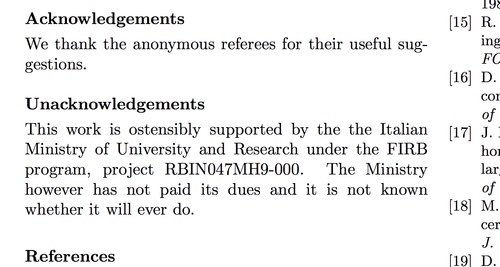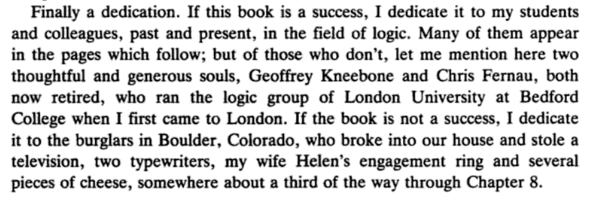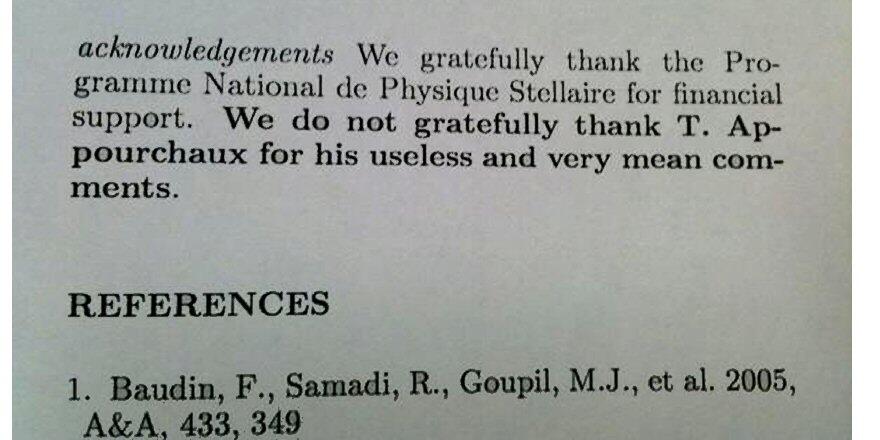A fantastic acknowledgements page had the academic twittersphere talking. Penned in the preliminary pages of an arcane book on dispensational modernism, Scott Jaschik of Inside Higher Ed wondered aloud if it might be the best book acknowledgement ever.
In case you missed it, here it is:
“I blame all of you. Writing this book has been an exercise in sustained suffering. The casual reader may, perhaps, exempt herself from excessive guilt, but for those of you who have played the larger role in prolonging my agonies with your encouragement and support, well…you know who you are, and you owe me.”
It was written by Brendan Pietsch, assistant professor of religious studies at Nazarbayev University in Astana, Kazakhstan. “After almost 10 years of working on it I couldn’t possibly come up with a full list of all the people who had helped,” he said.
By this author: A history of cats and academia
By this author: The weird world of academic Twitter
Such oddness in acknowledgements is not new. Researchers have thanked everyone from Rocco Siffredi (an Italian pornstar) for his “constant support”, to the thrash metal band Slayer for “continued advice and inspiration”, to Jon Frum (a cargo cult god). A couple of Barcelona fans working in the US managed to sneak in their home football chant, “Visca el Barça!”
“Unacknowledgements”, such as those in Pietsch’s book, are rarer than their positive counterparts, and are often as biting as they are amusing. The first such grumbling in an academic work appears to have been by three Italian researchers, who included an unackowledgements section in a paper:
“This work is ostensibly supported by the Italian Ministry of University and Research…The Ministry however has not paid its dues and it is not known whether it will ever do.”

Unsurprisingly, there are a few that relate to funding.
Sci-fi historian Adam Roberts wrote: “Let me record that I am not in the least grateful to the British Arts and Humanities Research Board – a plague on their house. That this book was ever completed owes nothing to them at all.” Evolutionary biologist Leigh Van Valen, who was “considered unconventional even by eccentrics”, wrote: “I thank the National Science Foundation for regularly rejecting my (honest) grant applications for work on real organisms, thus forcing me into theoretical work.”

Others explain the occasionally unusual circumstances surrounding their work:
- “Most of the paper was written during my daily commute from Vancouver to Surrey, Canada, and I would like to acknowledge TransLink, Metro Vancouver’s regional transportation authority, for making the task of writing in buses and trains such an enjoyable exercise.”
- “If the book is not a success, I dedicate it to the burglars in Boulder, Colorado, who broke into our house and stole a television, two typewriters, my wife Helen's engagement ring and several pieces of cheese, somewhere about a third of the way through Chapter 8.”

- “…would also like to thank the U.S. Immigration Service under the Bush administration, whose visa background security check forced her to spend two months (following an international conference) in a third country, free of routine obligations – it was during this time that the hypothesis presented herein was initially conjectured.”
Chandler Davis was serving a prison sentence for refusing to cooperate with the House Unamerican Activities Committee when he wrote: “Research supported in part by the Federal Prison System. Opinions expressed in this paper are the author’s and are not necessarily those of the Bureau of Prisons.”

Many include passive-aggressive nods towards those who they feel have wronged them:
- “We appreciate the very candid critical insights of 2 anonymous reviewers, M. Gompper, and K. Beard.”
- “We would like to thank Karla Miller for sleeping late one morning, leaving Tim and Steve a bit bored.”
- “I thank Graham Higman for allowing the dust of Oxford to rest on my unopened manuscript for thirty months.”
- “We do not gratefully thank T. Appourchaux for his useless and very mean comments.”

Caleb M. Brown helps us to end on a more positive note. He used his acknowledgments in a Cell paper to propose to his girlfriend – a fellow researcher at the Royal Tyrrell Museum of Palaeontology in Alberta, Canada. She said yes.
Glen Wright tweets @AcademiaObscura (send any other amusing acknowledgements his way). The Academia Obscura book is coming soon.




